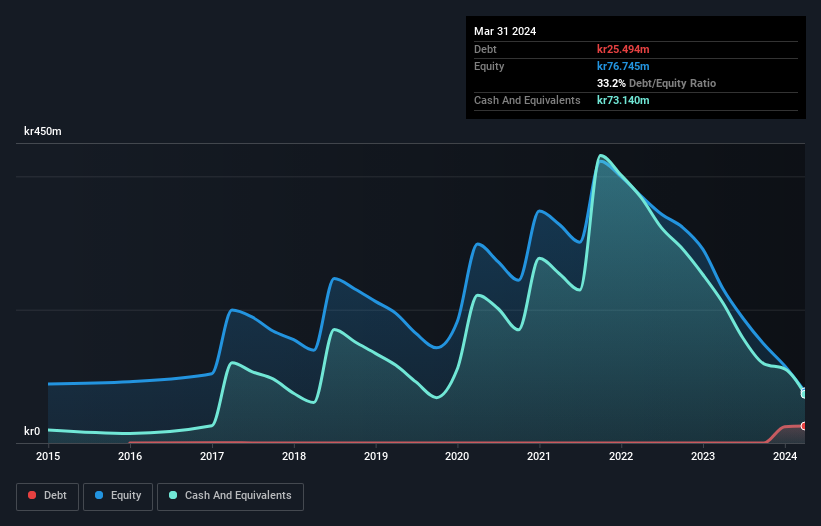IRLAB Therapeutics (STO:IRLAB A) Has Debt But No Earnings; Should You Worry?

The external fund manager backed by Berkshire Hathaway's Charlie Munger, Li Lu, makes no bones about it when he says 'The biggest investment risk is not the volatility of prices, but whether you will suffer a permanent loss of capital.' It's only natural to consider a company's balance sheet when you examine how risky it is, since debt is often involved when a business collapses. We note that IRLAB Therapeutics AB (publ) (STO:IRLAB A) does have debt on its balance sheet. But is this debt a concern to shareholders?
When Is Debt A Problem?
Debt and other liabilities become risky for a business when it cannot easily fulfill those obligations, either with free cash flow or by raising capital at an attractive price. Part and parcel of capitalism is the process of 'creative destruction' where failed businesses are mercilessly liquidated by their bankers. While that is not too common, we often do see indebted companies permanently diluting shareholders because lenders force them to raise capital at a distressed price. Of course, plenty of companies use debt to fund growth, without any negative consequences. When we think about a company's use of debt, we first look at cash and debt together.
View our latest analysis for IRLAB Therapeutics
What Is IRLAB Therapeutics's Net Debt?
As you can see below, at the end of March 2024, IRLAB Therapeutics had kr25.5m of debt, up from none a year ago. Click the image for more detail. However, it does have kr73.1m in cash offsetting this, leading to net cash of kr47.6m.

How Healthy Is IRLAB Therapeutics' Balance Sheet?
Zooming in on the latest balance sheet data, we can see that IRLAB Therapeutics had liabilities of kr34.4m due within 12 months and liabilities of kr25.5m due beyond that. Offsetting this, it had kr73.1m in cash and kr11.1m in receivables that were due within 12 months. So it actually has kr24.4m more liquid assets than total liabilities.
This surplus suggests that IRLAB Therapeutics has a conservative balance sheet, and could probably eliminate its debt without much difficulty. Simply put, the fact that IRLAB Therapeutics has more cash than debt is arguably a good indication that it can manage its debt safely. When analysing debt levels, the balance sheet is the obvious place to start. But ultimately the future profitability of the business will decide if IRLAB Therapeutics can strengthen its balance sheet over time. So if you're focused on the future you can check out this free report showing analyst profit forecasts.
Over 12 months, IRLAB Therapeutics made a loss at the EBIT level, and saw its revenue drop to kr5.7m, which is a fall of 89%. That makes us nervous, to say the least.
So How Risky Is IRLAB Therapeutics?
We have no doubt that loss making companies are, in general, riskier than profitable ones. And we do note that IRLAB Therapeutics had an earnings before interest and tax (EBIT) loss, over the last year. Indeed, in that time it burnt through kr162m of cash and made a loss of kr157m. With only kr47.6m on the balance sheet, it would appear that its going to need to raise capital again soon. Even though its balance sheet seems sufficiently liquid, debt always makes us a little nervous if a company doesn't produce free cash flow regularly. The balance sheet is clearly the area to focus on when you are analysing debt. But ultimately, every company can contain risks that exist outside of the balance sheet. We've identified 5 warning signs with IRLAB Therapeutics (at least 3 which shouldn't be ignored) , and understanding them should be part of your investment process.
Of course, if you're the type of investor who prefers buying stocks without the burden of debt, then don't hesitate to discover our exclusive list of net cash growth stocks, today.
If you're looking to trade IRLAB Therapeutics, open an account with the lowest-cost platform trusted by professionals, Interactive Brokers.
With clients in over 200 countries and territories, and access to 160 markets, IBKR lets you trade stocks, options, futures, forex, bonds and funds from a single integrated account.
Enjoy no hidden fees, no account minimums, and FX conversion rates as low as 0.03%, far better than what most brokers offer.
Sponsored ContentNew: AI Stock Screener & Alerts
Our new AI Stock Screener scans the market every day to uncover opportunities.
• Dividend Powerhouses (3%+ Yield)
• Undervalued Small Caps with Insider Buying
• High growth Tech and AI Companies
Or build your own from over 50 metrics.
Have feedback on this article? Concerned about the content? Get in touch with us directly. Alternatively, email editorial-team (at) simplywallst.com.
This article by Simply Wall St is general in nature. We provide commentary based on historical data and analyst forecasts only using an unbiased methodology and our articles are not intended to be financial advice. It does not constitute a recommendation to buy or sell any stock, and does not take account of your objectives, or your financial situation. We aim to bring you long-term focused analysis driven by fundamental data. Note that our analysis may not factor in the latest price-sensitive company announcements or qualitative material. Simply Wall St has no position in any stocks mentioned.
About OM:IRLAB A
IRLAB Therapeutics
IRLAB Therapeutics AB (publ) discovers and develops drugs for the treatment of Parkinson’s disease and other CNS disorders.
Adequate balance sheet low.
Market Insights
Community Narratives



